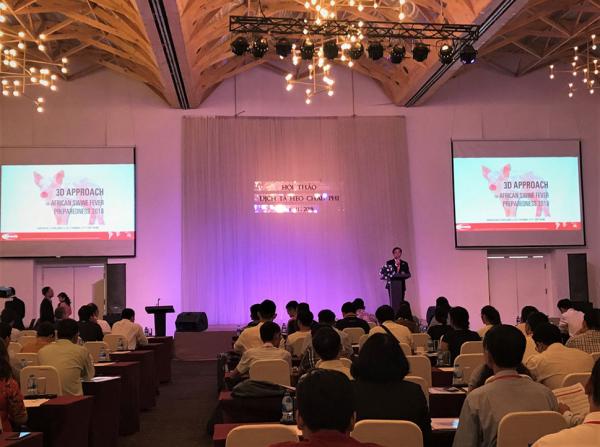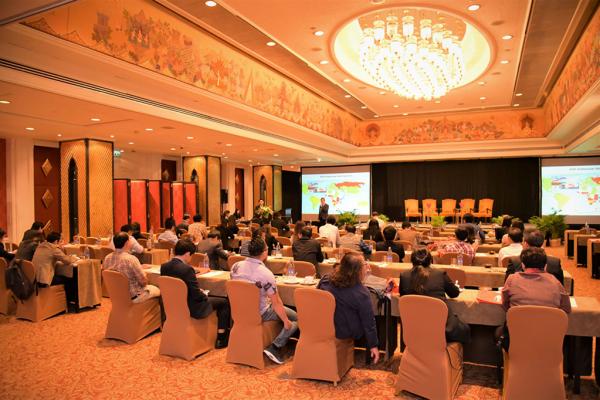Archive
SINGAPORE (November 14, 2018) – Kemin Industries, a global nutritional ingredient company that uses science to touch more than 3.8 billion people every day with its products and services, recently organized two “3D Approach to African Swine Fever Preparedness 2018” seminars in Bangkok and Ho Chi Minh City, Vietnam, to provide farmers with applicable information and tools to lessen the risk of African Swine Fever in their animals. The “3D Approach” comes from the three core aspects that farmers need to defend against African Swine Fever—the gut, feed and the environment.
After the first case of African Swine Fever was detected in China in August, the Food and Agriculture Organization of the United Nations (FAO) convened a meeting—Emergency Regional Consultation on African Swine Fever Risk Reduction and Preparedness—in September. As a responsible member of the animal industry, Kemin also hosted two seminars on its 3D Approach to educate swine farmers on African Swine Fever and equip them with the relevant knowledge and best practices they can use on their farms to prevent incidence of the virus.
A panel of eminent speakers and informed thought leaders spoke to seminar attendees about mitigating the threat of African Swine Fever at the farm level. Keynote speaker Prof. Grzegorz Wozniakowski, Head of Department and National Reference Laboratory for African Swine Fever at the Department of Swine Diseases at PIWet, gave a presentation about his experience managing African Swine Fever in Europe.
"Without strict biosecurity regulations and high awareness of African Swine Fever (ASF), the virus might be transferred to any so-far-unaffected country. With the ASF spread—presently in wild boars—in affected European countries, the crucial role of hunters and veterinary inspection cannot be overestimated," said Prof. Wozniakowski.
The panelists also shared their experiences and knowledge on African Swine Fever. Prof. Guoqing Shao from the Institute of Veterinary Medicine, Jiangsu Academy of Agricultural Sciences, talked about the measures taken to contain African Swine Fever occurrence in China. Dr. Pariwat Poolperm, an assistant professor from the Department of Farm Resources and Production Medicine, Faculty of Veterinary Medicine, Kasetsart University, discussed how being equipped with knowledge about African Swine Fever can save animals. Dr. Khampee Kortheerakul, a consultant to Kemin Industries in Association of Southeast Asian Nations (ASEAN) Economic Community (AEC) countries, offered how to go one step further in being prepared for Asian Swine Fever in ASEAN.
Dr. Tinh Nguyen, Regional Technical Service Manager, Kemin Animal Nutrition and Health – Asia Pacific, also addressed attendees.
“Presently, no vaccine is effective against the African Swine Fever. It is critical for swine farmers to be aware of the three defensive approaches available in limiting spread of the virus,” said Dr. Nguyen.
To strengthen the biosecurity of a farm’s environment and better reduce the risk of pathogen occurrence, Dr. Nguyen recommends farmers enhance their animals’ immunity with Aleta™ and protect feed with formaldehyde-based Sal CURB™.
To learn more about Aleta, please visit www.kemin.com/ap/en/products/aleta.
###
About Kemin Industries
Kemin Industries (www.kemin.com) is a global ingredient manufacturer with a focus on improving the quality of life for over 3.8 billion people each day with more than 500 specialty ingredients made for the human and animal health, pet food, nutraceutical, food technology, crop technologies and textile industries.
For over half a century, Kemin has been dedicated to using applied science to address industry challenges and offers product solutions to customers in more than 120 countries. Kemin provides ingredients to feed a growing population with its commitment to the quality, safety and efficacy of food, feed and health-related products.
Established in 1961, Kemin is a privately-held, family-owned and operated company with more than 2,500 employees globally and operations in 90 countries, including manufacturing facilities in Belgium, Brazil, China, India, Italy, Russia, Singapore, South Africa and the United States.
Certain statements may not be applicable in all geographic regions. Product labelling and associated claims may differ based upon regulatory requirements.

